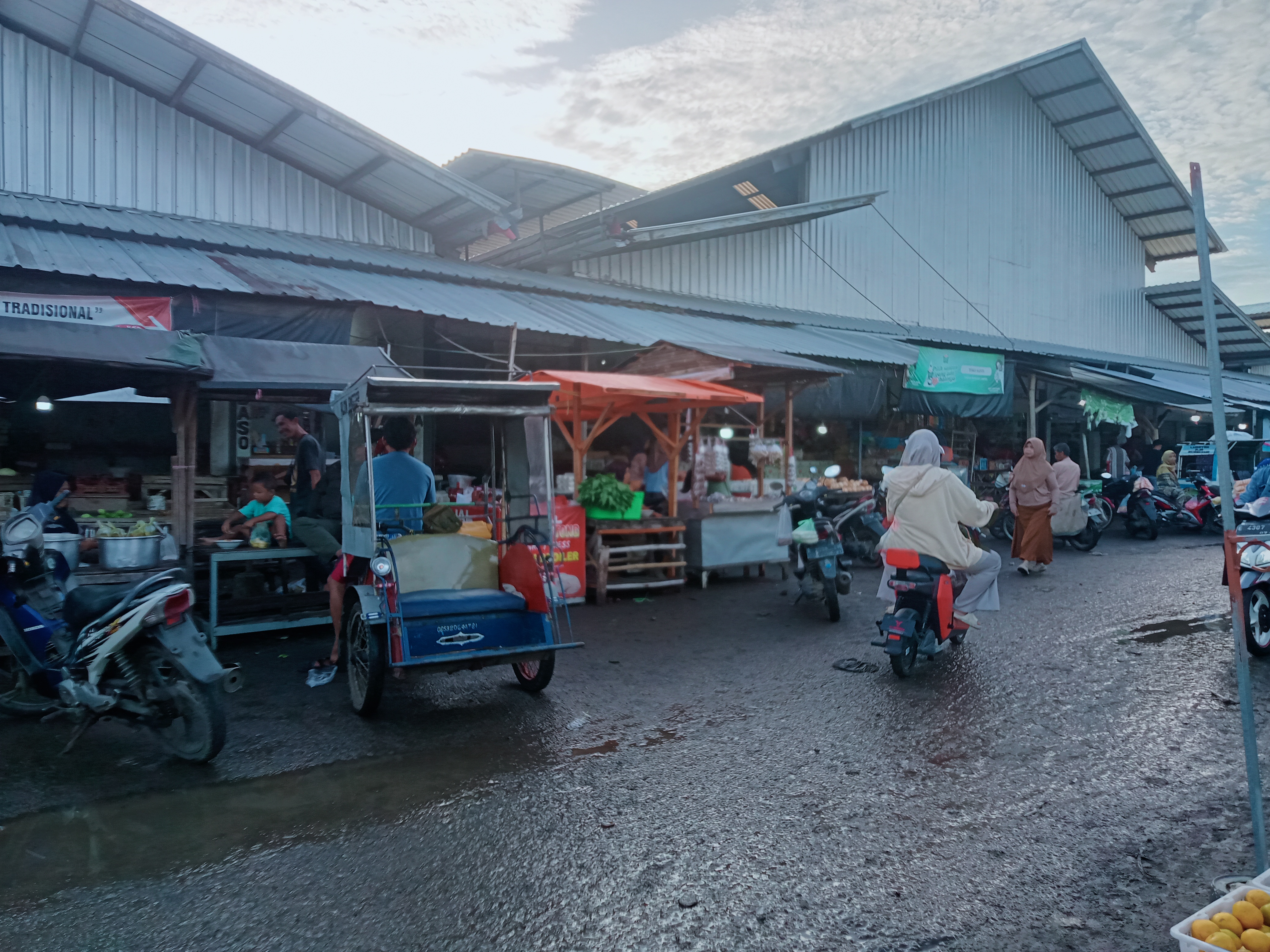"Happiness is not in what we have, but in who we share it with."
🌸🌺💐

At the end of the year, our house came alive again. My two older children returned from boarding school for their long holiday, which stretched until January. My eldest, a high school sophomore, and the second, a third-year middle schooler, were greeted with wide-eyed joy by their youngest sibling, still in kindergarten. The house buzzed with laughter and chatter, as if happiness, long tucked away, had suddenly been released in one glorious burst.
This morning, my wife had a grand plan. She wanted to cook ikan bumbu kuning—a yellow spiced fish dish beloved by the kids. Nothing gave her greater peace than seeing them eat heartily at the dining table. And so, as expected, I found myself her faithful chauffeur on the journey to the morning market.
She could’ve gone alone, of course. But she said there was something special about having me accompany her—something that made the trip feel more meaningful. Whether it was my presence or just an excuse to keep me close, I never asked. After all, this was one of those requests you just couldn’t refuse.
I grabbed my jacket, put on my helmet, and started the motorcycle with the ease of routine. The crisp morning air greeted us as we set off, the roads still quiet. The cold wind bit through my sleeves, but there was a warmth I couldn’t quite explain—maybe it was because she was behind me, holding my waist as if ensuring I stayed on course.
When we arrived at the market, I was hit by a symphony of smells—fishy freshness mingled with the tang of forgotten vegetables, a hint of ripe durian, and the unmistakable sweat of people hustling to survive. For those unfamiliar with traditional markets, this was the scent of "adventure." For me? It was the unmistakable aroma of "chaotic resilience."





Our market was not the kind you’d see in glossy travel brochures. This was a raw, muddy mess—especially after last night’s heavy rain. Puddles dotted the uneven ground, turning every step into a gamble. Even a stray cat, confident in its agility, slipped near a vegetable stall. I swear I saw it look embarrassed.
Stalls were arranged in complete defiance of logic. A butcher chopped away near a seller of fried snacks, while durians stood proudly beside tired-looking greens. No partitions, no rules. A kind of anarchic harmony. And make no mistake—this wasn’t mere disarray; this was the lifeblood of many families.
I found a parking spot, or at least what passed for one. There were no official spaces, so everyone parked wherever they pleased. Following their example, I stopped where it seemed least likely to cause trouble. Then I turned to my wife and said, with the authority of a man who knew his limits, “I’ll wait here. Call me if you need anything.”
She nodded, knowing full well that involving me in fish selection or price haggling was a recipe for disaster. I might excel at picking motorcycles, but distinguishing fresh fish from ones that had "contemplated life" on ice for days was beyond me.
My wife moved with purpose, first heading straight for the fish vendor. She examined each option with the precision of a jeweler appraising diamonds—checking the gills, sniffing the aroma, performing secret tests I dared not question. If I ever tried to interfere, she’d simply look at me as if to say, “You really don’t get it, do you?”
Satisfied with her choice, she moved on to the vegetable stall. With practiced ease, she grabbed corn, carrots, and petai—those infamously pungent beans that could clear a room but somehow brought joy to our kitchen. I didn’t argue. Some things were worth enduring.
Then, as always, she vanished into the labyrinth of the market, likely in search of spices and seasonings. Meanwhile, I stood where I was, observing.
The market was alive with stories written on faces. There was the beaming smile of a vendor whose goods were selling fast, the tense frown of a buyer trying to negotiate a better deal, and the weary yet hopeful expression of a becak driver waiting for his next customer.
One becak driver caught my attention. His face looked older than his years, etched with lines of struggle. He leaned on his handlebars, lost in thought—perhaps worrying about the rice supply at home, the leaking roof, or the sharp words his wife might have if he came home empty-handed. But when he chatted with a fellow driver, a small, genuine smile broke through. It was the kind of smile you’d find only in the company of those who understand your battles without a single word.
I turned my gaze to the husbands waiting on their motorbikes. Some tapped their shoes impatiently against the pavement. Others sat slouched, their faces a mix of boredom and quiet despair. And yet, a few heroic souls accompanied their wives, carrying increasingly heavy bags without complaint. These were the market warriors, the unsung heroes of marital harmony.
Still, not all wives wanted their husbands tagging along. I understood why. We men had an annoying habit of asking, “Are we done yet?” The question itself seemed innocent, but its effect was volcanic.
“Done?” the wife would snap, glaring while clutching a half-filled bag. “We’ve only been to two stalls!”
That’s when I realized: true wisdom at the market was knowing when to keep quiet. Silence, after all, was golden—especially when your wife was still negotiating the price of fish. And if you wanted peace later at home, silence was your best bet to ensure ikan bumbu kuning made it to the table.
After what felt like an eternity of waiting, it was finally over. My wife returned with her bounty of fresh ingredients, her face glowing with satisfaction. And me? I couldn’t hide my relief. At last, we could head home.
The moment we arrived, the house came alive with activity. My wife wasted no time; she headed straight to the kitchen and began the meticulous process of preparing the meal. The kids, still buzzing with excitement from being home, joined in to help. Their laughter filled the air as they peeled vegetables, washed herbs, and sneaked tiny tastes of the ingredients when their mother wasn’t looking.
It felt like a celebration—a small feast after months of separation. The smell of spices wafted through the house, mingling with the warmth of togetherness. For a while, the world outside disappeared. There was only us, gathered in the kitchen, creating something simple yet extraordinary: a meal made with love, shared with those who mattered most.
This was more than cooking. It was a ritual, a reminder that no matter how far life takes us, the heart of home always beats strongest in moments like these.
We ate together that late morning. Our modest dining table felt unusually festive. At its center stood a large pot of yellow spiced fish, the star of the meal, surrounded by warm rice, spicy sambal, and a plate of petai whose aroma filled the air.
The children were radiant with joy. The eldest shared stories about school assignments, claiming they were tough but manageable. The middle child, as usual, dominated the conversation with endless chatter, making everyone laugh with their animated storytelling. Meanwhile, the youngest, with innocent curiosity, pointed at every dish and asked, “What’s this, Mom?”
Their laughter filled the house, creating a warmth that was simple yet irreplaceable. The food might not be extraordinary to others, but for us, this morning felt like a little celebration wrapped in love.
My wife sat quietly beside me, her hands trembling slightly as she slid a piece of fish onto the youngest’s plate. Her eyes were glassy, though she tried to hide it behind a faint smile. Amid the chaos of children’s laughter, her movements carried a weight I couldn’t quite name—perhaps the burden of love that always gives and never asks.
I watched her, silently, as she watched them. The eldest spoke of school assignments, his voice filled with pride and the echoes of a boy turning into a man. The middle child, with his boisterous energy, commanded the table’s attention, his stories tumbling over one another, leaving us in fits of laughter. And the youngest, blissfully unaware of time’s cruel march, sat contentedly nibbling at petai, his tiny voice occasionally chiming in with innocent questions.
This scene, this fragile moment, was a gift I knew could never be replicated.
As the meal drew to a close, the middle child grinned and said, “Mom, make yellow-spiced fish again when we come home next time, okay?” The eldest nodded in agreement, and even the youngest clapped his small hands. My wife laughed, a soft, tender sound, and promised them she would.
But I saw it—behind her laughter, a shadow. The kind of shadow that only mothers carry. She knew, as I did, that next time wasn’t guaranteed. Time is a thief, stealthy and cruel. It takes our children, little by little, as they grow taller and stronger, their footsteps leading them farther from home.
Later, after the plates were cleared and the house grew quieter, I sat alone at the dining table, staring at the empty spaces where moments ago they had laughed, argued, and filled the room with life.
The silence pressed down on me, heavy yet humbling. I thought of how these fleeting mornings are all we have. How each one feels like a miracle—a banquet of love disguised as something ordinary.
Tears blurred my vision as gratitude swelled in my chest. I whispered a prayer, a mixture of thanks and plea: Thank You for this family, for this moment, for this love that overwhelms me. And please, let me hold onto it, even if only in my heart.
For I know, one day, the dining table will be emptier still. One day, their laughter will become a distant echo in this quiet home. But until then, I will cherish this morning, this fleeting perfection, with every beat of my heart.
Because happiness is not in permanence. It is in the fleeting, fragile moments that remind us how precious they truly are.
We must make the most of our time with our children, our partner, our friends, because we don't know how long we will be around.
Even take advantage of an outing to the market, because happiness is found in the little things.
Absolutely, every moment counts. We often overlook the simple things like a trip to the market or a quiet evening together, but these are the moments that truly shape our memories. Time with those we love, even in the most ordinary settings, becomes extraordinary when we cherish it.
Congratulations @yunima! You have completed the following achievement on the Hive blockchain And have been rewarded with New badge(s)
Your next target is to reach 300 upvotes.
You can view your badges on your board and compare yourself to others in the Ranking
If you no longer want to receive notifications, reply to this comment with the word
STOPCheck out our last posts: